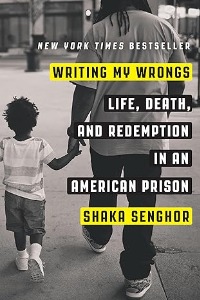Unveiling the Untold Side of *Writing My Wrongs: Life, Death, and Redemption in an American Prison*
An in-depth look at Shaka Senghor's memoir, *Writing My Wrongs*, which explores his journey from a life of crime to redemption and advocacy. This article discusses the book's authenticity, impact on criminal justice reform, and lessons of vulnerability and change.
Table of Contents
Unveiling the Untold Side of
Introduction
When I first stumbled upon Writing My Wrongs: Life, Death, and Redemption in an American Prison by Shaka Senghor, I wasn’t quite prepared for the emotional rollercoaster it would take me on. The book, a New York Times bestseller, is an eye-opening memoir that delves into the complexities of life amidst America’s mass incarceration epidemic. What makes this book truly exceptional isn't just Senghor's raw and poignant narrative, but the profound insights it offers into the human spirit, redemption, and the possibilities of second chances.
The Man Behind the Words
Shaka Senghor, raised in a middle-class neighborhood on Detroit’s east side, had a promising start. An honor roll student with aspirations of becoming a doctor, his life took a drastic turn when family turmoil and abuse drove him to the streets. By the age of nineteen, he found himself in prison for murder, consumed by anger and despair.
Yet, Senghor’s story is not one of perpetual downfall. During his nineteen-year incarceration, including seven years in solitary confinement, he found solace and transformation in literature, meditation, and self-examination. His journey from a life of crime to becoming an influential activist and mentor is nothing short of inspiring.
Why It Became a Bestseller
1. Authenticity and Relatability
Senghor’s story is rooted in authenticity. He doesn’t shy away from the harsh realities of his life or the mistakes he made. This raw honesty resonates deeply with readers. People see parts of themselves in his struggles and his resilience, making the narrative profoundly relatable.
2. A Voice for the Voiceless
In a society grappling with the complexities of the criminal justice system, Senghor's memoir provides an inside look at the lives of those ensnared by it. His experiences shed light on the systemic issues that perpetuate the cycle of crime and incarceration, fostering a greater understanding and empathy in readers. His advocacy for prison reform is not just theoretical; it’s deeply personal and informed by lived experience.
3. Influential Endorsements
Endorsements from prominent figures like Michelle Alexander, Bryan Stevenson, and Oprah Winfrey lend credibility and draw attention to the book. These endorsements are not mere formalities; they underscore the importance and impact of Senghor’s story. When such influential voices speak, people listen—and read.
4. A Tale of Redemption
At its core, Writing My Wrongs is a story of redemption. It’s about overcoming the worst parts of oneself and finding a path to atonement. This theme of redemption is universally appealing. It provides hope and a roadmap for others seeking to turn their lives around, no matter the mistakes of their past.
5. Cultural and Social Relevance
The book's release coincided with a growing public discourse around mass incarceration and criminal justice reform. Senghor’s story adds a personal dimension to these discussions, making the book not only a compelling read but also a relevant and timely one.
Lessons to Learn and Imitate
1. Embrace Vulnerability
Senghor’s willingness to be vulnerable and open about his life is a powerful tool. Authenticity fosters connection. In writing or in any endeavor, embracing vulnerability can create a profound impact and foster genuine connections with others.
2. Advocate for Change
Using personal experiences to advocate for broader societal change can amplify one’s voice. Senghor's work in criminal justice reform shows that personal stories can be powerful catalysts for change. Find your cause and use your story to influence and inspire.
3. Never Underestimate the Power of Redemption
Everyone makes mistakes, but it's the journey of redemption that defines us. Senghor’s life exemplifies that it’s never too late to change, to seek forgiveness, and to make amends. This is a powerful message for anyone feeling trapped by their past.
4. Utilize Your Platform
Leveraging platforms to spread one’s message can significantly increase its reach. Senghor's engagements with TED, the Aspen Ideas Festival, and media platforms have helped amplify his story and message. Use whatever platforms are available to you to spread your message far and wide.
Conclusion
Writing My Wrongs is more than just a memoir; it’s a testament to the resilience of the human spirit and the transformative power of redemption. Shaka Senghor’s journey from a troubled youth to a beacon of hope and change is a story that needs to be told and retold. It’s a reminder that no matter how far we fall, there’s always a way back, and that our stories can inspire change in ways we might never imagine.
If you haven’t read it yet, do yourself a favor and pick up a copy. You might just find your own path to redemption and a deeper understanding of the world around you.
Read Writing My Wrongs on Amazon
Story updated onSeptember 4, 2024
Table of Contents

Writing My Wrongs: Life, Death, and Redemption in an American Prison
Shaka Senghor